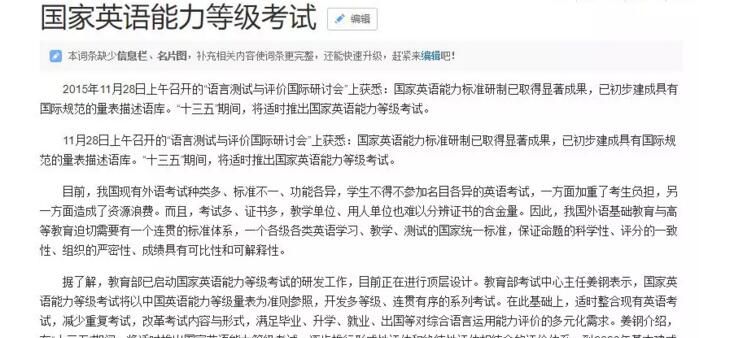07年全国硕士研究生入学考试英语模拟试题三
|
Section I Use of English Directions: Read the following text. Choose the best word(s) for each numbered blank and mark A, B, C or D on ANSWERSHEET 1. (10 points) It can, of course, be argued that though the vast majority of people contribute to the funds of social security equally, working-class persons are more likely to receive social security benefits than upper-class persons. This is true for those benefits which can be 1 as being for forms of "diswelfare", to use Titmuss's term, i. e. a form of monetary 2 for the hardship they suffer through the 3 of the social and economic system—benefits for industrial disability, unemployment and illness 4 supplementary benefit. It is not, 5 , true of retirement __6__and they 7 account for at least half the expenditure of social security widely 8 . Since retirement pensions are paid to all who have paid the necessary number of 9 they involve a negative form of vertical redistribution of income—from the poor to the rich— 10 retired persons of higher income groups live longer than those of lower income groups. This is 11 crucial importance because all the studies 12 have examined the question of the redistributive effects of social security 13 a limited income period—at most during a period of twelve months. It is not surprising therefore 14 they reached the conclusion that social security benefits the poor at the 15 of the rich. Had they examined the question over a much longer period, 16 over the whole life cycle, they 17 reached a different conclusion. If one also takes into 18 the fact that 19 benefits for retirement, widowhood and sickness strongly 20 the middle and upper classes, then the combined operation of the State and occupational benefits over the entire life cycle involves a negative form of vertical redistribution of income. 1. [A] recorded [B] nominated [C] registered [D] classed 2. [A] compensation [B] agreement [C] consolation [D] allowance 3. [A] mechanism [B] operation [C] procedure [D] appliance 4. [A] instead of [B] as well as [C] apart from [D] rather than 5. [A] furthermore [B] therefore [C] however [D] otherwise 6 [A] subsidies [B]budgets [C]allowances [D] pensions 7. [A] would rather [B] still less [C] after all [D] in short 8. [A] defined [B] controlled [C] distributed [D] designed 9. [A] contributions [B] imputs [C] subscriptions [D] preliminary 10. [A] though [B] if [C] because [D] while 11 [A] above [B] for [C] with [D]of 12 [A] so far [B] thereby [C] thereof [D] by far 13 [A] within [B] from [C] out of [D] after 14 [A] that [B] when [C] whether [D] though 15 [A] discharge [B] sacrifice [C] expense [D] approval 16 [A] practically [B] exclusively [C] preferably [D] precisely 17 [A] must have [B] will have [C] may have [D] would have 18 [A] claim [B] account [C] credit [D] access 19 [A]professional [B]occupational [C] specialist [D] laborious 20 [A] favor [B] affirm [C] facilitate [D] privilege Section II Reading Comprehension Part A Directions: Read the following four texts. Answer the questions below each text by choosing A, B, C or D. Mark your answers on ANSWER SHEET 1. (40 points) Text 1 The author of some forty novels, a number of plays, volumes of verse, historical, critical and autobiographical works, an editor and translator, Jack Lindsay is clearly an extraordinarily prolific writer—a fact which can easily obscure his very real distinction in some of the areas into which he has ventured. His co-editorship of Vision in Sydney in the early 1920's, for example, is still felt to have introduced a significant period in Australian culture, while his study of Kickens written in 1950 is highly regarded. But of all his work it is probably the novel to which he has made his most significant contribution. Since 1936 when, to use his own words in Fanfrolico and after, he "reached bedrock," Lindsay has maintained a consistent Marxist viewpoint—and it is this viewpoint which if nothing else has guaranteed his novels a minor but certainly not negligible place in modern British literature. Feeling that "the historical novel is a form that has a limitless future as a fighting weapon and as a cultural instrument" (New Masses, January 1937), Lindsay first attempted to formulate his Marxist convictions in fiction mainly set in the past: particularly in his trilogy in English novels—1949 (dealing with the Digger and Leveller movements), Lost Birthright (the Wilkesite agitations), and Men of Forty-Eight (written in 1939, the Chartist and revolutionary uprisings in Europe). Basically these works set out, with most success in the first volume, to vivify the historical traditions behind English Socialism and attempted to demonstrate that it stood, in Lindsay's words, for the "true completion of the national destiny. " Although the war years saw the virtual disintegration of the left-wing writing movement of the 1930’s, Lindsay himself carried on: delving into contemporary affairs in We Shall Return and Beyond Terror, novels in which the epithets formerly reserved for the evil capitalists or Franco's soldiers have been transferred rather crudely to the German troops. After the war Lindsay continued to write mainly about the present—trying with varying degrees of success to come to terms with the unradical political realities of post-war England. In the series of novels known collectively as "The British Way," and beginning with Betrayed Spring in 1953, it seemed at first as if his solution was simply to resort to more and more obvious authorial manipulation and heavy-handed didacticism. Fortunately, however, from Revolt of the Sons* this process was reversed, as Lindsay began to show an increasing tendency to ignore party solutions, to fail indeed to give anything but the most elementary political consciousness to his characters, so that in his latest (and what appears to be his last) contemporary novel, Choice of Times, his hero, Colin, ends on a note of desperation: "Everything must be different. I can't live this way any longer. But how can I change it. how9" To his credit as an artist, Lindsay doesn't give him any explicit answer. 21. According to the text, the career of Jack Lindsay as a writer can be describe [A] inventive. [B] productive. [C] reflective. [D] inductive. 22. The impact of Jack Lindsay's ideological attitudes on his literary success w [A] utterly negative. [B] obviously positive. [C] limited but indivisible. [D] obscure in net effect. 23. According to the second paragraph, Jack Lindsay firmly believes in [A] the gloomy destiny of his own country. [B] the function of literature as a weapon. [C] his responsibility as an English man. [D] his extraordinary position in literature. 24. It can be inferred from the last paragraph that [A] the radical writers were greatly influenced by the war. [B] Jack Lindsay was less and less popular in England. [C] Jack Lindsay focused exclusively on domestic affairs. [D] the war led to the ultimate union of all English authors. 25. According to the text, the speech at the end of the text [A] demonstrates the author's own view of life. [B] shows the popular comments on Jack Lindsay. [C] offer the author's opinion on Jack Lindsay. [D] indicates Jack Lindsay's change of attitude. Text 2 In studying both the recurrence of special habits or ideas in several districts, and their prevalence within each district, there come before us ever-repeated proofs of regular causation producing the phenomena of human life, and of laws of maintenance and diffusion conditions of society, at definite stages of culture. But, while giving full importance to the evidence bearing on these standard conditions of society, let us be careful to avoid a pitfall which may entrap the unwary student. Of course the opinions and habits belonging in common to masses of mankind are to a great extent the results of sound judgment and practical wisdom. But to a great extent it is not so. That many numerous societies of men should have believed in the influence of the evil eye and the existence of a firmament, should have sacrificed slaves and goods to the ghosts of the departed, should have handed down traditions of giants slaying monsters and men turning into beasts—all this is ground for holding that such ideas were indeed produced in men's minds by efficient causes, but it is not ground for holding that the rites in question are profitable beliefs sound, and the history authentic. This may seem at the first glance a truism, but, in fact, it is the denial of a fallacy which deeply affects the minds of all but a small critical minority of mankind. Popularly, what everybody says must be true, what everybody does must be right—“Quod ubique. quod semper, quod ab omnibus creditum est, hoc est vere proprieque Catholicum"—and so forth. There are various topics, especially in history, law, philosophy, and theology, where even the educated people we live among can hardly be brought to see that the cause why men do hold an opinion, or practise a custom, is by no means necessarily a reason why they ought to do so. Now collections of ethnographic evidence bringing so prominently into view the agreement of immense multitudes of men as to certain traditions, beliefs, and usages, are peculiarly liable to be thus improperly used in direct defense of these institutions themselves, even old barbaric nations being polled to maintain their opinions against what are called modern ideas. As it has more than once happened to myself to find my collections of traditions and beliefs thus set up to prove their own objective truth, without proper examination of the grounds on which they were actually received, I take this occasion of remarking that the same line of argument will serve equally well to demonstrate, by the strong and wide consent of nations, that the earth is flat, and nightmare the visit of a demon. 26. The author's attitude towards the phenomena mentioned at the beginning of the text is one of [A] skepticism. [B] approval. [C] indifference. [D] disgust. 27. By “But to . . . it is not so"(Line 8) the author implies that [A] most people are just followers of new ideas. [B] even sound minds may commit silly errors. [C] the popularly supported may be erroneous . [D] nobody is immune to the influence of errors. 28. Which of the following is closest in meaning to the statement "There are various ... to do so"(Line 17—20)? [A] Principles like history and philosophy are hard to deal with. [B] People like to see what other people do for their own model. [C] The educated are more susceptible to errors in their daily life. [D] That everyone does the same may not prove they are all right. 29. Which of the following would the author probably suggest? [A] Support not the most supported. [B] Deny everything others believe. [C] Throw all tradition into trashcan. [D] Keep your eyes open all the time. 30. The author develops his writing mainly by means of [A] reasoning. [B] examples. [C] comparisons. [D] quotations. Text 3 The provision of positive incentives to work in the new society will not be an ea-y task. But the most difficult task of all is to devise the ultimate and final sanction to replace the ultimate sanction of hunger—the economic whip of the old dispensation. Moreover, in a society which rightly rejects the pretence of separating economics from politics and denies the autonomy of the economic order that sanction can be found only in some conscious act of society. We can no longer ask the invisible hand to do our dirty work for us. I confess that I am less horror-struck than some people at the prospect, which seems to me unavoidable, of an ultimate power of what is called direction of labor resting in some arm of society, whether in an organ of state or of trade unions. I should indeed be horrified if I identified this prospect with a return to the conditions of the pre-capitalist era. The economic whip of laissez-faire undoubtedly represented an advance on the serf-like conditions of that period: in that relative sense, the claim of capitalism to have established for the first time a system of "free" labor deserves respect. But the direction of labor as exercised in Great Britain in the Second World War seems to me to represent as great an advance over the economic whip of the heyday of capitalist private enterprise as the economic whip represented over pre-capitalist serfdom. Much depends on the effectiveness of the positive incentives, much, too, on the solidarity and self-discipline of the community. After all, under the system of laissez-faire capitalism the fear of hunger remained an ultimate sanction rather than a continuously operative force. It would have been intolerable if the worker had been normally driven to work by conscious fear of hunger; nor, except in the early and worst days of the Industrial Revolution, did that normally happen. Similarly in the society of the future the power of direction should be regarded not so much as an instrument of daily use but rather as an ultimate sanction held in reserve where voluntary methods fail. It is inconceivable that, in any period or in any conditions that can now be foreseen, any organ of state in Great Britain would be in a position, even if it had the will, to marshal and deploy the labor force over the whole economy by military discipline like an army in the field. This, like other nightmares of a totally planned economy, can be left to those who like to frighten themselves and others with scarecrows. 31. The word "sanction"(Line 2, Paragraph 1) is closest in meaning to [A] corrective measures. [B] encouraging methods. [C] preventive efforts. [D] revolutionary actions. 32. Which of the following is implied in the first paragraph? [A] People used to be forced to work under whips. [B] The author dislikes the function of politics in economy. [C] Incentives are always less available than regulations. [D] People have an instinct of working less and getting more. 33. The author's attitudes towards future, as is indicated in the beginning of the second paragraph is one of [A] reluctant acceptance. [B] sheer pessimism. [C] mild optimism. [D] extreme hopefulness. 34.The author of the text seems to oppose the idea of [A] free market. [B] military control. [C] strict regulations. [D] unrestrained labors. 35.The last sentence of the text indicates the author's [A]hatred. [B] affection. [C] stubbornness. [D] rejection. Text 4 Over the last decade, demand for the most common cosmetic surgery procedures, like breast enlargements and nose jobs, has increased by more than 400 percent. According to Dr. Dai Davies. of the Plastic Surgery Partnership in Hammersmith, the majority of cosmetic surgery patients are not chasing physical perfection. Rather, they are driven to fantastic lengths to improve their appearance by a desire to look normal. "What we all crave is to look normal, and normal is what is prescribed by the advertising media and other external pressures. They give us a perception of what is physically acceptable and we feel we must look like that". In America, the debate is no longer about whether surgery is normal; rather, it centers on what age people should be before going under the knife. New York surgeon Dr. Gerard Imber recommends "maintenance" work for people in their thirties. "The idea of waiting until one needs a heroic transformation is silly," he says. "By then, you've wasted 20 great years of your life and allowed things to get out of hand. " Dr. Imber draws the line at operating on people who are under 18, however. "It seems that someone we don't consider old enough to order a drink shouldn't be considering plastic surgery." In the UK cosmetic surgery has long been seen as the exclusive domain of the very rich and famous. But the proportionate cost of treatment has fallen substantially, bringing all but most advanced laser technology within the reach of most people. Dr. Davies, who claims to "cater for the average person", agrees. He says: "I treat a few of the rich and famous and an awful lot of secretaries. Of course, £3.000 for an operation is a lot of money. But it is also an investment for life which costs about half the price of a good family holiday. " Dr. Davies suspects that the increasing sophistication of the fat injecting and removal techniques that allow patients to be treated with a local anaesthetic in an afternoon has also helped promote the popularity of cosmetic surgery. Yet, as one woman who recently paid £2,500 for liposuction to remove fat from her thighs admitted, the slope to becoming a cosmetic surgery Veteran is a deceptively gentle one. "I had my legs done because they’d been bugging me for years. But going into the clinic was so low key and effective it whetted my appetite. Now I don't think there's any operation that I would rule out having if I could afford it. " 36. According to the text, the reason for cosmetic surgery is to [A] be physically healthy. [B] look more normal. [C] satisfy appetite. [D] be accepted by media. 37. According to the third paragraph, Dr. Davies implies that [A] cosmetic surgery, though costly, is worth having. [B] cosmetic surgery is too expensive. [C] cosmetic surgery is necessary even for the average person. [D] cosmetic surgery is mainly for the rich and famous. 38. The statement "draws the line at operating on people"(Line 6, Paragraph 2) is close meaning to [A] removing wrinkles from the face. [B] helping people make up. [C] enjoying operating. [D] refusing to operate. 39. It can be inferred from the text that [A] it is wise to have cosmetic surgery under 18. [B] cosmetic surgery is now much easier. [C] people tend to abuse cosmetic surgery. [D] the earlier people have cosmetic surgery, the better they will be. 40. The text is mainly about [A] the advantage of having cosmetic surgery. [B] what kind of people should have cosmetic surgery. [C] the reason why cosmetic surgery is so popular. [D] the disadvantage of having cosmetic surgery. Part B Directions: The following paragraphs are given in a wrong order for Questions 41-45,you are required to reorganize these paragraphs into a coherent article by choosing from the list A-E to fill in each numbered box. The first and the last paragraphs have been placed for you in Boxes. Mark your answers on ANSWER SHEET 1.(10 points) A. So when the next IPCC report is released in February 2007, who will be the targets and why? When New Scientist spoke to researchers on both sides of the climate divide it became clear that they are ready for a showdown. If the acrimony were to become so intense that American scientists were forced to stop helping in the preparation of IPCC reports, it could seriously dent the organisation and rob the world of some significant voices in the climate change debate. B. One of those who knows only too well what it is like to come under attack from climate change skeptics is Ben Santer of the Lawrence Livermore Laboratory in California. The lead author of a chapter in the 1995 IPCC report that talked for the first time about the "discernible human influence on global climate", he was savaged by skeptics and accused of introducing this wording without consulting colleagues who had helped write the chapter. One skeptic called it the "most disturbing corruption of the peer-review process in 60 years". Another accused him of "scientific cleansing" - at a time when the phrase "ethnic cleansing" was synonymous with genocide in Bosnia. The IPCC investigated and dismissed the allegations as baseless. C. The attacks fit a familiar pattern. Sceptics have also set their sights on scientists who have spoken out about the accelerating meltdown of the ice sheets in Greenland and Antarctica and the thawing of the planet's permafrost. These concerns will be addressed in the next report by the Intergovernmental Panel on Climate Change (IPCC), the global organization created by the UN in 1988 to assess the risks of human-induced climate change. Every time one of these assessments is released, about once every five years, some of the American scientists who have played a part in producing it become the targets of concerted attacks apparently designed to bring down their reputations and careers. At stake is the credibility of scientists who fear our planet is hurtling towards disaster and want to warn the public in the US and beyond. D. Santer says, however, that he expects attacks to continue on other fronts. "There is a strategy to single out individuals, tarnish them and try to bring the whole of the science into disrepute," he says. "And Kevin Trenberth is a likely target." Mann agrees that the scientists behind the upcoming IPCC report are in for a rough ride. "There is already an orchestrated campaign against the IPCC by climate change contrarians," he says. E. Another scientist to suffer the ire of the skeptics was Michael Mann of Pennsylvania State University in University Park. He was attacked after the IPCC assessment in 2001, which highlighted his "hockey stick" graph showing that temperatures began a rapid rise in recent decades and are now higher than at any time over the past thousand years. The skeptics accused Mann of cherry-picking his data and criticized him for refusing to disclose his statistical methods which, they claimed, biased the study to show recent warming (New Scientist, 18 March, p 40). Last year, Texas Republican Congressman Joe Barton, chair of the House Committee on Energy and Commerce, ordered Mann to provide the committee with voluminous details of his working procedures, computer programs and past funding. Barton's demands were widely condemned by fellow scientists and on Capitol Hill. "There are people who believe that if they bring down Mike Mann, they can bring down the IPCC," said Santer at the time. Mann's findings, which will be endorsed in the new IPCC report, have since been replicated by other studies. F. Kevin Trenberth reckons he is a marked man. He has argued that last year's devastating Atlantic hurricane season, which spawned hurricane Katrina, was linked to global warming. For the many politicians and minority of scientists who insist there is no evidence for any such link, Trenberth's views are unacceptable and some have called for him step down from an international panel studying climate change. "The attacks on me are clearly designed to get me fired or to resign," says Trenberth. G. The "contrarians" include scientists and politicians who are skeptical of the scientific evidence for climate change. Some of those who spoke to New Scientist insist that they are not planning character assassinations, and intend merely to engage in robust scientific debate, not least by challenging the IPCC's status as the arbiter of truth on climate change. Part C. Directions: Read the following text carefully and then translate the underlined segments into Chinese. Your translation should be written clearly on ANSWER SHEET 2. (10 points) For more than 40 years, a controlling insight in my educational philosophy has been the recognition that no one has ever been —no one can be — educated in school or college. (46) That would be the case if our schools and colleges were at their very best, which they certainly are not, and even if the students were among the best and the brightest as well as conscientious in the application of their powers. The reason is simply that youth itself—immaturity—is an unconquerable obstacle to becoming educated. Schooling is for the young. Education comes later, usually much later. (47) The very best thing for our schools to do is to prepare the young for continued learning in later life by giving them the skills of learning and the love of it. Our schools and colleges are not doing that now, but that is what they should be doing. (48) To speak of an educated young person or of a wise young person, rich in the understanding of basic ideas and issues, is as much a contradiction in terms as to speak of a round square. The young can be prepared for education in the years to come, but only mature men and women can become educated, beginning the process of their 40s and 50s and reaching some amount of genuine insight, sound judgment and practical wisdom after they have turned 60. This is what no high school or college graduates know or can understand. As a matter of fact, most of their teachers do not seem to know it. (49) In their obsession with covering ground and in the way in which they test or examine their students, they certainly do not act as if they understood that they were only preparing their students for education in later life rather than trying to complete it within the realms of their institutions. There is, of course, some truth in the ancient insight that awareness of ignorance is the beginning of wisdom. But, remember, it is just the beginning. From there on one has to do something about it. (50) And to do it intelligently one must know something of its causes and cures—why adults need education and what, if anything, they can do about it. Section III Writing Part A. You want to apply for the following job: waiter/waitress required for evening work. Some experience necessary. Write a letter to Mr. Byron to 1) show your interest in the job; 2) make a introduction of yourself, and 3) explain why you would be suitable for the job. Part B. Directions: It is very common in society today for people to stand back and watch a situation happening rather than see what they can do to help. Be sure to include: 1. An interpretation of the illustration; 2. A specific example of the phenomenon; 3. Your opinion on the matter. You should write about 160-200 words neatly on ANSWER SHEET 2. 答案:1-20 DABBC DCAAC DABAC CCDBBA Part A 21-30. BCBAD ACDDA 31-40. ABACD BADBC 41-45 CABED |








